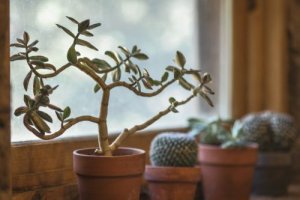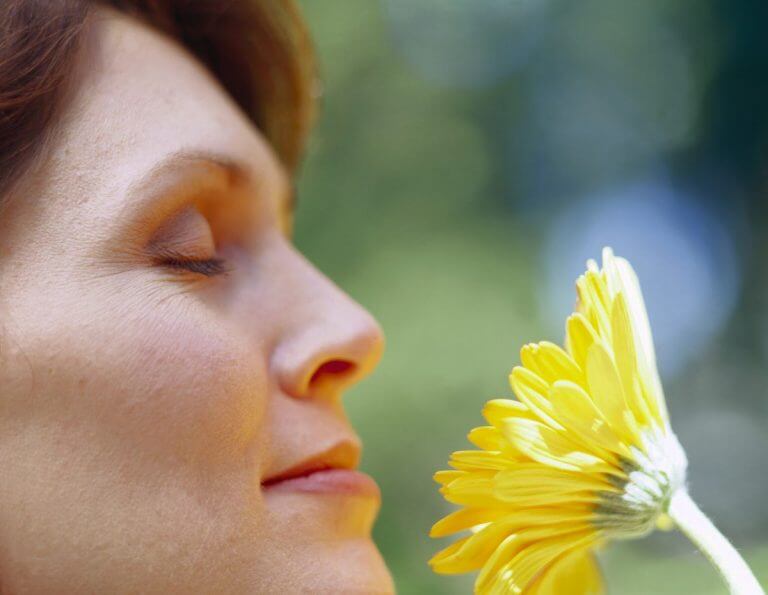7 Benefits of Having a Plant at Home

Houseplants don’t just look nice. They’re also good for you, both physically and emotionally. In this article, you’ll learn 7 benefits of having a plant at home.
Find the right plants for your particular space and the amount of time you have for them.
Then, take them home and enjoy the following benefits:
1. They purify the air
In 1989, scientists at NASA researched the best plants to purify the air inside.
This is an important point to keep in mind, since we’re exposed to all kinds of contaminants every single day.
Taking into account air quality in closed spaces and what kind of plants you’d find for sale, these were their recommendations:
- Bamboo palm: It’s easy to take care of and reduces levels of formaldehye (a chemical product widely used as a bactericide and preservative).
- Areca palm: Great for both the home and office, this plant grows slowly, doesn’t need much water, and has leaves that are excellent at purifying the air.
- Ficus: A favorite for cleaning the air of chemicals, this plant has a versatile look, with its different shapes, trunks, and sizes.
“Take a look at this too: Pothos Plant to Purify the Air in Your Home”
2. They make you happy

Some people claim that plants have the power to influence your mood.
If you’re a sensitive person and sense that living things give off positive and negative energy, these plants are ideal for you:
- Violets: These are ideal if there is conflict and discord in your home, as it will help keep the peace and reduce stress.
- Ivy: It’s believed that ivy brings good fortune to your home.
- Anthurium: Known as “masculine happiness,” it’s recommended for increasing fertility in men and increasing libido.
3. They’re good for your mental health
Taking care of a plant or several plants clears your mind, inspires love and affection, and, most of all, helps with stress and anxiety.
If you can, grow a garden. It’s an activity that burns calories, stimulates your senses as you work in the soil, and activates your creativity.
4. They reduce noise levels

In addition to cleaning the air, plants also have the ability to work as sound proofers.
That’s why you see buildings lined with greenery and vegetation. It makes the exterior look nice but also keeps traffic noise out.
5. They have a relaxing effect
You can also take advantage of mother nature’s goodness and grow plants that will help you during times of anxiety:
- Saint John’s wort: Because it contains hypericin (an antibiotic and inhibitor), this plant is recommended for treating depression, anxiety, insomnia, and the emotional symptoms of menopause.
- Passionflower: This herb has a soothing effect, encourages relaxation, and helps with the symptoms of anxiety.
- Valerian: This plant is great at reducing stress levels, helping you fall asleep, stabilizing your heart rate, and making you feel better if you are sad or upset.
“Take a look at this too: 5 Medicinal Herbs for Treating Depression”
6. They help you concentrate

There are plants for reducing anxiety and stress, and there are also plants to improve your concentration.
Whether you use them in teas, aromatherapy or even in the bath, these herbs are the perfect way to naturally stimulate your brain:
- Rosemary: This has multiple properties that are good for your health, one of which is improving your memory.
- Lemon balm: Stimulates mental focus and helps with sadness and insomnia.
- Marshmallow plant: The quintessential soothing plant. It contains a substance that helps keep your memory in good shape.
7. They’re a source of positive energy
Some schools of philosophic thought, like feng shui, claim that certain plants attract positive energy.
So, make your home a magnet for good energy with the following plants:
- Lavender: Ideal for people who get insomnia, lavender encourages balanced energy and a sense of well-being.
- Ferns: They provide protection and increase your self-esteem. Keep one in the house if you’re going through a breakup.
- Chrysanthemum: This plant gives off a sense of well-being to everybody in the house.
As you can see, plants are extremely good to have in your home, no matter what your beliefs are.
You’ll get something out of each different plant, whether adding some beauty to your house, improving your physical or emotional health, or attracting good energy.
All cited sources were thoroughly reviewed by our team to ensure their quality, reliability, currency, and validity. The bibliography of this article was considered reliable and of academic or scientific accuracy.
- Wolverton, B., Johnson, A., & Bounds, K. (1989). Interior landscape plants for indoor air pollution abatement. National Aeronautics and Space Addminitration, NASA. https://doi.org/10.1007/s13398-014-0173-7.2
- Lohr, V. I., Pearson-Mims, C. H., & Goodwin, G. K. (1996). IInterior plans may improve worker productivity and reduce stress in a windowless environment. Journal of Environmental Horticulture. https://doi.org/10.1016/j.mehy.2014.10.014
- Dravigne, A., Waliczek, T. M., Lineberger, R. D., & Zajicek, J. M. (2008). The effect of live plants and window views of green spaces on employee perceptions of job satisfaction. HortScience. https://doi.org/
This text is provided for informational purposes only and does not replace consultation with a professional. If in doubt, consult your specialist.








